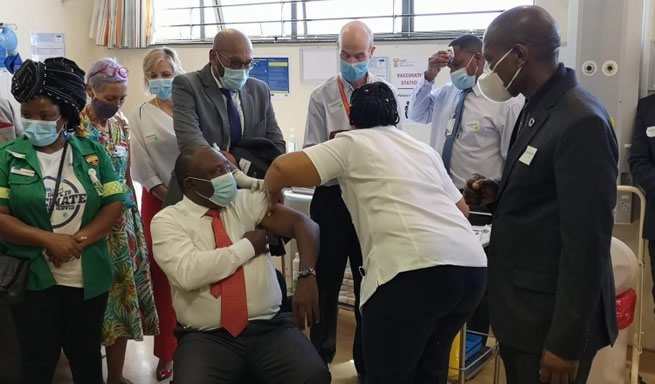Experts warn – Covid-19 won’t disappear in our lifetime
Experts warn – Covid-19 won’t disappear in our lifetime

Masks, hand sanitising and social distancing are likely to remain critical in the war against Covid for years to come
As Covid-19 vaccination programmes roll out around the world and the pandemic begins showing signs of slowing down in hard-hit places such as the US, UK and SA, experts warn that the coronavirus is likely to remain a fact of life for years to come.
“Vaccines are not a magic wand,” said Prof Barry Schoub, who heads the vaccine component of the ministerial advisory committee. “They won’t switch off the pandemic.”
Speaking at the “Covid 19: Myths and Vaccine” webinar organised by the Hellenic Federation of SA on Wednesday night, Schoub said people could not afford to drop their guard this year and would need to continue adhering to the proven non-pharmaceutical interventions — face masks, hand sanitising and social distancing.
The Sars-CoV2 virus was just one of “hundreds of viruses”, Schoub warned.
“This virus will not just disappear — not in our lifetime,” he said. “We will need to tolerate it.”
Fellow panellist, Business for SA health working group chair Stavros Nicolaou, agreed that the virus would be present for some time to come and that people should not drop their guard.
“Vaccination and non-pharmaceutical interventions present the best opportunity for us to return to normality.”
The challenge for SA was to roll out its vaccination programme as smoothly as possible.
After chaotic scenes at Steve Biko Hospital last week, when hundreds of ineligible staff arrived to get vaccinated, Nicolaou told Sunday Times Daily that procedures had been tightened up and hospitals were now better equipped to cope.
About a million people are due to be vaccinated during the first phase, followed by 18 million in phase two and 21 million in phase three.
About 40,000 health care workers have been vaccinated to date.
A further consignment of 80,000 vaccine doses is due to land in SA on Sunday.
These will be earmarked for medical staff who fall under the 1A category. This includes front-line staff who work directly with Covid-19 patients, as well as people who work in ICUs.
The phase one vaccine rollout is likely to put government’s readiness for the second phase under the spotlight.
“We’ve been very focused on phase one,” said Nicolaou. “We have to claw back phase two urgently.”
The vaccine rollout’s first phase will take about three months, while the second and third phases will each take about six months.
The second phase, which will cover essential workers as well as elderly people who have comorbidities, is due to begin in May.
“We know the categories of patients but we need to settle on the definition of who the essential workers are.”
Patients will be divided into categories along similar lines to healthcare workers, he said, with “1A” patients in the top tier and “1D” at the bottom.
The task is likely to be easier in the private sector, he said.
“The medical schemes have all that data.”
While there have been concerns that healthcare workers in rural areas might not have been able to register online to get vaccinated during the first phase rollout, Nicolaou noted that they will have been able to use their phones to register.
“The bigger challenge will be phase two in the rural areas,” he said.
Schoub meanwhile dismissed concerns over SA’s procurement of vaccines.
SA has been a victim of vaccine nationalism in which high-income countries can afford to put down non-refundable deposits for untested vaccines.
“Imagine if we had pre-bought 40 million doses of the AstraZeneca vaccine,” he said.
The rollout of the AstraZeneca vaccine, of which SA secured a million doses, has been halted after tests showed it offered scant protection against the new variant of the virus circulating in SA.
The AstraZeneca vaccine will be sent to other AU countries which do not have the new variant.
SA has since secured 500,000 doses of Johnson & Johnson’s single-shot vaccine, which has proved to offer 57% protection against the variant developing mild Covid-19 illness and 83% protection against developing severe illness.
The J&J doses were secured from material that had been earmarked for clinical trials and had been donated to SA.
Nicolaou said it was also important to note that if vaccine procurement had been left to the private sector, only seven to eight million people would have been covered.
Comments are closed.